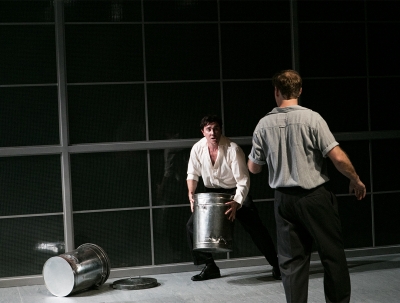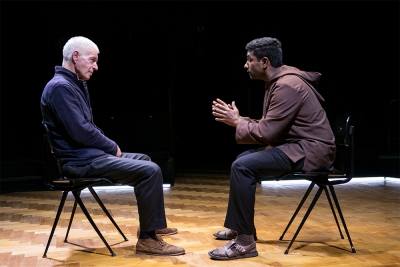Belvoir St Theatre
I made the mistake of rereading Peter Goldsworthy’s 1993 novella before seeing Steve Rodgers’ adaptation of Jesus Wants Me for a Sunbeam at Belvoir St Theatre, so I knew the play’s advertised surprise ending and may have been resistant to its emotional charge. At its première production for National Theatre of Parramatta at the Riverside Theatre in 2018, it was said to reduce audiences to tears. Some audience members could be seen wiping their eyes after the opening night performance at Belvoir.
... (read more)You would have to be living under a rock the size of Uluru not to be aware of the reassessment of the masculine sense of dominance and entitlement that is sweeping the Western world at the moment. From an American president who has openly boasted of assaulting women to a member of the royal family who, in an interview about his relationship with a notorious paedophile, blithely ignores the damage that this man and his cohorts inflicted on young women, we have seen a stunning lack of empathy towards the less powerful and well connected. In the business world, some consider this to be a requisite for success. It has become something of a truism to claim, as does Jon Ronson in his controversial book The Psychopath Test, that a high percentage of CEOs have psychopathic tendencies.
... (read more)You plan to present a new radical production of Hamlet. But it’s a long play and you only have a small cast. It will need a fair bit of pruning and you’ll have to lose some characters or at least reduce their importance. You will leave in the soliloquies of course, but Rosencrantz and Guildenstern can go, as can the players ...
... (read more)Parallel importation
Dear Editor,
I’d like to thank Colin Golvan QC for his intelligent, articulate, and well-argued response to the Productivity Commission report’s proposed changes to parallel importations and fair use, published as both a podcast and a brief commentary by ABR (November 2016 ...
Brian Friel’s play Faith Healer is now considered to be, if not his masterpiece Translations (1980) probably takes that distinction at least one of his most successful works, but it took a while before its sneakily subverted approach to truth and illusion was appreciated. Its 1979 Broadway première ...
... (read more)In his introduction to the Folio Society edition of Twelfth Night, Peter Hall describes the play as a transitional work. Moving on from the light-heartedness of A Midsummer Night's Dream, in Twelfth Night Shakespeare mixes grief and cruelty in with the comedy. We are advancing towards ...
... (read more)As our government prepares to increase our involvement in a Middle Eastern disaster we should never have taken part in, Brecht’s Mother Courage and Her Children seems more pertinent than ever.
The theatre of Bertolt Brecht has always pr ...
Hedda Gabler (1890) occupies a somewhat schizophrenic position in Henrik Ibsen’s work. On the one hand, it is normally seen as the apotheosis of Ibsen’s realist period, his sardonic homage to the fashionable ‘well-made play’ of the time. But, on the other hand, from early in its theatrical life there have been productions which have reacted against the naturalistic style in which the play seems to have been couched.
... (read more)I first saw Summer of the Seventeenth Doll in 1957 in London, of all places. I remember feeling some pride in seeing the symbolic kewpie doll presiding over the New Theatre in the heart of the West End. June Jago’s performance as Olive has stayed with me over the years; Philip Hope-Wallace, the Guardian reviewer, described her as ‘all chin and elbows, but as genuine a dramatic actress as you could find’, which suggested an element of surprise that she should be ‘found’ in Australia. Jago had been in the original 1955 Union Rep production and placed her stamp on Olive: she was to be a hard act to follow. When The Doll came to London it had already won itself a unique place in Australian drama, but there had been some concern about how the Brits would receive a play about rough canecutters and free-and-easy barmaids. But critics like Hope-Wallace hailed ‘this harsh, cawing, strongly felt play’. The imperial imprimatur sealed the success of The Doll. Its later failure on Broadway could be dismissed as a judgement on American audiences rather than the play.
... (read more)




